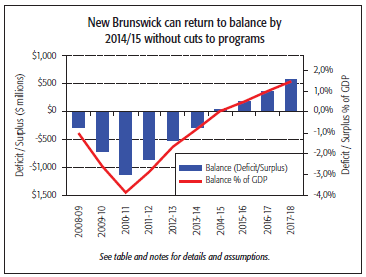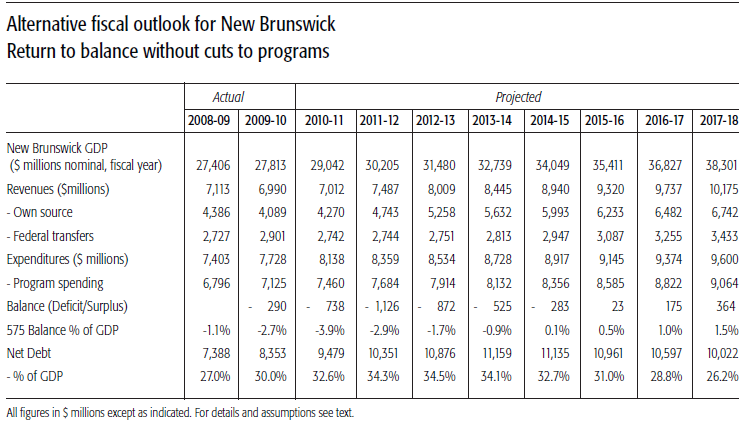Fiscal sky not falling over New Brunswick
All eyes may be on Ottawa when the federal budget is released this afternoon, but it isn’t the only government tabling its budget today. Â
 New Brunswick’s new Conservative government will also be tabling its first budget today–and it’s expected to include austerity spending cuts at the same time that they proceed with further corporate tax cuts.   Â
The following is an analysis I did of the province’s fiscal situation for groups in the province, provoked in response to the alarmist outlook by the TD Bank’s Don Drummond. It shows New Brusnwick could return to budget balance on the same schedule as the government plans without cuts to public spending by reversing the tax cuts and reductions in revenue capacity.
This is also available on-line. in PDF format.
Better alternatives: why the fiscal sky isn’t falling over New Brunswick
New Brunswickers have recently heard alarming warnings about their province’s finances.Â
Last November, Finance Minister Blaine Higgs warned the province was spending considerably more on public services that it can afford and its financial situation was “unprecedentedâ€. Also in November, former Toronto Dominion Bank chief economist Don Drummond warned the province could be heading for a $2 billion deficit within five years. Early this month the province’s Auditor General reported that the province’s financial position was unsustainable and had worsened.Â
All of this may have been predictable when the previous government embarked on deep cuts to corporate and personal income taxes in the midst of the recession as the deficit doubled.  But is the fiscal sky really falling over New Brunswick?  Is there no alternative but to cut public services and sell off the province’s assets to save it from fiscal Armageddon?
First, let’s look at some facts.  Yes, New Brunswick’s deficit last year was relatively high, but as share of the economy it’s less than half what it was in 1982/83 and about the same share as during the last recession in 1991/92.  The province’s net debt as a share of its economy remains lower than every province east of Manitoba.  If New Brunswick was facing imminent financial collapse, then surely the bond market debt collectors would already be at the doors of these five other provinces.
But what of the future?  Won’t high rates of spending growth and low economic growth eventually bankrupt the province?  It is true that a province can’t continue to increase its spending forever at a faster rate than its revenues grow.  Eventually that will of course be unsustainable.  But this doesn’t mean New Brunswickers have to face cuts to their public services and growing austerity. Â
There are better alternatives.   The province could return to balanced budgets within four years—on the same timeline as the government is planning—without cutting public services. What it will take is reversing some of the tax cuts that have been made, particularly those for higher incomes and corporations. The following table shows that New Brunswick can return to a balanced budget by 2014/15 by:
- Reversing recent tax cuts to bring the province’s own-source revenues gradually back up to a 17.6% share of the economy. This is less than the average for the 1990 to 2008 period.
- Gradually reducing—but not cutting—program spending growth to 2.75% a year.  This would be enough to maintain moderate growth in public services to cover inflation at 2% a year and population growth estimated at 0.5% a year. Efficiencies in public services could be devoted to improving and expanding public services.

The assumptions underlying this alternative fiscal forecast are all very reasonable. They include:
New Brunswick’s economy grows at the rate forecasted by the TD Bank and then at a moderate pace or 4% a year in nominal dollars (or 2% in real terms).
- Federal transfers increase at the rates currently set by the federal government. These include 3% annual increases for the Canada Social Transfer, 6% for the Canada Health Transfer, a 3-year moving average increases for Equalization payments, 3% for other transfers, and with major transfer protection provided for one further year.
- The rate of interest for debt interest payments gradually declines as the province’s high yield existing debt matures and can be rolled over at more reasonable rates.

New Brunswick’s personal and corporate tax cuts will cost the province over $400 million annually within a few years. Over half of the value of these tax cuts will go to the 6% of New Brunswick taxfilers who make over $80,000 a year. Those in the top tax bracket of $120,000 plus will get a tax cut from the province worth close to $6,000 a year by 2012.  Those with an income of $400,000 will get a tax break from the province equivalent to about $20,000 a year.
The recent report from New Brunswick’s Auditor General noted the province should be cautious about the scope for increasing its revenues as a share of the economy.  However, this report just considered provincial own-source revenues. Total government revenues as a share of New Brunswick’s economy are now about three percentage points lower than they were on average during the 1990 to 2008 period.
New Brunswick should stop competing in the race to the bottom by cutting taxes. This approach is leading to growing deficits, increasing inequality and excuses to cut public services and sell off public assets to the private sector.    The only real beneficiaries of these policies are the province’s wealthiest.  Most of the rest will face cuts to public services that exceed the value of any tax cuts they receive. There is a better and much more reasonable alternative without cuts to public services that can just as rapidly return the province to fiscal balance.

Do you have comment on the budget, now that it’s been released? And how about the Telegraph-Journal series on the public service?